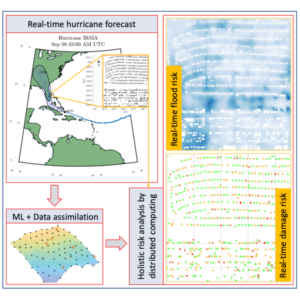
Natural hazards, such as hurricanes, cause billions of dollars of losses each year due to damage and failure of infrastructure. Adaptive design of infrastructure and accurate real-time communication of risk levels are key to increasing the resilience of communities to natural hazards. Central to these ideas is the capability to predict the response of complex and interdependent infrastructure systems through computational modeling over varying time horizons. For the results to be of real-time use to decision-makers and citizens, such frameworks must capture the effects of uncertainty, climate change, and the socio-economic impacts of disasters and recovery. Recent advances in distributed simulation provide a language to link disparate disciplines and enable unprecedented collaborations between researchers working at multiple scales. They provide a general setting that enables the two-way coupling between discipline-specific modeling approaches. This opens the door to the possibility of, for example, effectively integrating damage modeling, data assimilation, metamodeling for uncertainty propagation, hurricane modeling, agent-based modeling of people, and coastal flood simulation for the real-time prediction of the impact of impeding hurricanes on coastal communities.
People

Seymour MJ
Spence
CEE
Engineering

Sherif
El-Tawil
CEE
Engineering

Jeremy
Bricker
CEE
Engineering
Funding

Funding: $45K (2023)
Goal: Develop a preliminary framework for real-time damage estimation of communities subject to impending hurricanes and real-time communication of risk levels through the integration of metamodeling and data assimilation within the setting of distributed computing frameworks.
Token Investors: Seymour MJ Spence, Sherif El-Tawil, and Jeremy Bricker
Project ID: 1104
